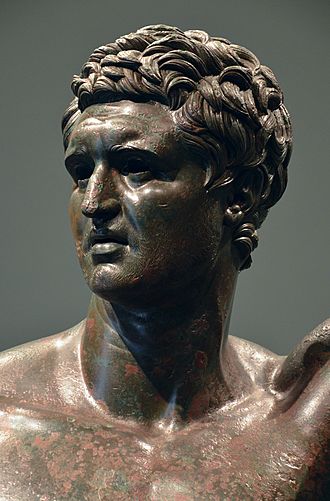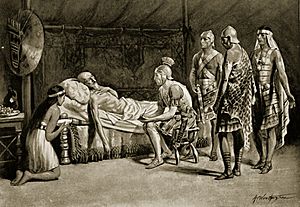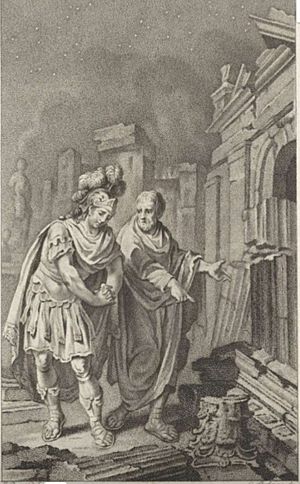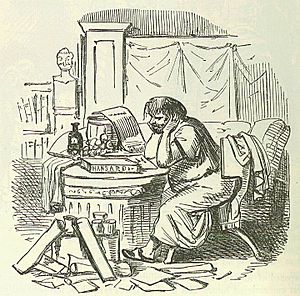Scipio Aemilianus facts for kids
Quick facts for kids
Publius Cornelius Scipio Africanus Aemilianus
|
|
|---|---|

The so-called "Hellenistic Prince", possibly Scipio Aemilianus
|
|
| Born | 185 BC |
| Died | 129 BC (aged 55–56) |
| Nationality | Roman |
| Occupation | General and statesman |
| Office | Consul (147, 134 BC) |
| Spouse(s) | Sempronia |
| Relatives | Lucius Aemilius Paullus Macedonicus (father) Scipio Africanus (adoptive grandfather) Ti. Gracchus (brother-in-law) |
| Military career | |
| Rank | Proconsul |
| Wars | Third Punic War • Battle of the Port of Carthage • Second Battle of Nepheris • Siege of Carthage Numantine War • Siege of Numantia |
| Awards | Mural Crown Grass Crown 2 Roman triumphs |
Publius Cornelius Scipio Africanus Aemilianus (born 185 BC, died 129 BC) was a famous Roman general and leader. People often called him Scipio Aemilianus or Scipio Africanus the Younger. He was known for his military victories in the Third Punic War against Carthage and the Numantine War in Spain.
Scipio Aemilianus led the Roman army to finally defeat and destroy the city of Carthage. He also supported many writers and thinkers, including the Greek historian Polybius. In politics, he disagreed with the land reform plans of his brother-in-law, Tiberius Gracchus.
Contents
Scipio's Family Background
Scipio Aemilianus was the second son of Lucius Aemilius Paullus Macedonicus. His father was a Roman commander who won a big war in Macedon. Scipio's mother was Papiria Masonis.
Later, Scipio was adopted by his cousin, Publius Cornelius Scipio. This made the famous general Scipio Africanus, who defeated Hannibal in the Second Punic War, Scipio Aemilianus's adoptive grandfather. When he was adopted, he took on the name Publius Cornelius Scipio Aemilianus. The name "Aemilianus" showed his original family.
Scipio's Military Adventures
Scipio Aemilianus was a skilled military leader. He fought in several important wars for Rome.
Early War Experience
Scipio's father, Lucius Aemilius Paullus, took his two older sons to fight in Greece during the Third Macedonian War (171–168 BC). The writer Plutarch said Scipio was his father's favorite son. He believed Scipio was naturally more talented than his brothers.
After a major battle, Scipio's father worried because his younger son was missing. The whole army searched for him. Scipio, who was seventeen at the time, finally returned. He was covered in the blood of enemies he had defeated. Everyone admired him for his bravery and leadership skills.
Fighting in the Numantine War
In 151 BC, Rome was fighting a difficult war in Spain against the Celtiberians. Roman soldiers were afraid to join the army because of heavy losses. Young men made excuses to avoid serving. Even experienced officers did not want to volunteer.
Scipio Aemilianus stepped forward. He asked the Senate to send him to Spain as an officer. This was a brave move, as it was safer to go to Macedon. His decision inspired many others. Ashamed by Scipio's example, many men began to volunteer for the army.
Scipio served under General Lucullus. He was awarded a mural crown. This special award was given to the first soldier who climbed the wall of a besieged city. He also won a rare honor called the spolia opima by defeating an enemy king in single combat.
The Third Punic War

Even after Rome defeated Carthage in the Second Punic War, some Romans still wanted Carthage completely destroyed. A famous Roman leader, Cato the Elder, always ended his speeches by saying, "Carthage must be destroyed."
In 150 BC, Carthage asked Scipio Aemilianus for help. They were having problems with a Numidian prince named Massinissa. Rome had told Carthage they could not defend themselves without Rome's permission. When Carthage fought back against Massinissa, Rome saw it as a violation. In 149 BC, Rome declared war on Carthage.
At first, the Romans struggled in the war. But Scipio Aemilianus, serving as an officer, showed great skill. In 147 BC, he was elected consul, even though he was too young for the job. He was sent to lead the war in Africa.
After a year of hard fighting, Scipio captured the city of Carthage. About 50,000 people survived and were taken prisoner. Following the orders of the Senate, Scipio ordered the city to be emptied, burned, and completely destroyed. This ended the Third Punic War. When he returned to Rome, he received a grand parade called a Roman Triumph. He also earned the special name "Africanus" for his victory.
The Final Numantine War
In 134 BC, Scipio was elected consul again. Citizens believed he was the only one who could defeat the Numantines in the Numantine War. The city of Numantia in Spain had strong defenses and had resisted Rome for nine years.
The Roman army in Spain was not well-disciplined. Scipio focused on making them strong again. He stopped luxuries and made them do tough exercises every day. Once the army was ready, he marched towards Numantia. He used a longer route to avoid enemy traps. He even dug wells in dry areas to find water for his men.
Scipio then prepared to surround Numantia. He built a nine-kilometer-long wall around the city. He also built towers by the Durius River to stop enemies from escaping by water. By cutting off all supplies, Scipio forced the Numantines to surrender due to starvation. He destroyed the city and brought fifty men back to Rome for his triumph. For this success, Scipio Aemilianus received another special name: "Numantinus."
Scipio's Political Life
Scipio Aemilianus also played a role in Roman politics.
Scipio as Censor
In 142 BC, Scipio Aemilianus became a censor. Censors were important officials who kept track of citizens and their behavior. During his time as censor, Scipio tried to stop the growing luxury and bad habits in Rome. In 139 BC, he was accused of wrongdoing by a man he had removed from his position as censor. Scipio gave powerful speeches to defend himself.
Scipio and Tiberius Gracchus
Scipio helped his relative Tiberius Gracchus in 137 BC. Tiberius had made a peace treaty during the Numantine War that the Senate rejected. Scipio used his influence to help save the Roman soldiers involved in the treaty.
Later, Tiberius Gracchus became a Plebeian Tribune and pushed for a law to give land to poor citizens. Scipio was fighting in Spain at the time. He disagreed with some of Gracchus's actions. When he heard about Gracchus's death, Scipio quoted a line from Homer, suggesting that those who cause trouble might face a bad end.
After returning to Rome, Scipio was asked about Tiberius's death. His answer showed he disliked Gracchus's methods. This made him unpopular with some people. Later, when a group tried to put Gracchus's land law into action, Scipio supported Rome's allies who were complaining about the process. This made the Roman people angry with him. They felt he was taking the side of the allies against them.
Scipio died peacefully at home. Most historians today believe he died of natural causes.
Scipio's Character and Interests

Scipio was a very educated person. He loved learning and kept two brilliant men, Polybius and Panaetius, with him. He balanced his military duties with his studies. He was always either training for war or learning new things. Polybius even traveled with Scipio to explore Africa.
Scipio was known for speaking very clearly and well. He also had a good sense of humor. He is a main character in a famous part of Cicero's book, De re publica, called the "Dream of Scipio."
Scipio Aemilianus loved Greek culture, which is called Philhellenism. He was a patron of the "Scipionic circle," a group of thinkers, poets, and politicians. This group included Roman writers like Lucilius and Terence, and Greek thinkers like Polybius and the philosopher Panaetius.
Even though he admired Greek culture, Scipio also strongly supported old Roman traditions. As censor, he gave a speech urging people to follow the customs of their ancestors. He believed that some new practices were going against Roman ways.
A famous story tells how Scipio felt after destroying Carthage. He looked at the burning city and cried for his enemies. He thought about how all cities and empires, like people, eventually fall. He then quoted a line from Homer about the fall of Troy. When Polybius asked him what he meant, Scipio said he feared for his own country, Rome, when he thought about the fate of all human things.
See also
 In Spanish: Escipión Emiliano para niños
In Spanish: Escipión Emiliano para niños
- Scipio–Paullus–Gracchus family tree
 | Toni Morrison |
 | Barack Obama |
 | Martin Luther King Jr. |
 | Ralph Bunche |


